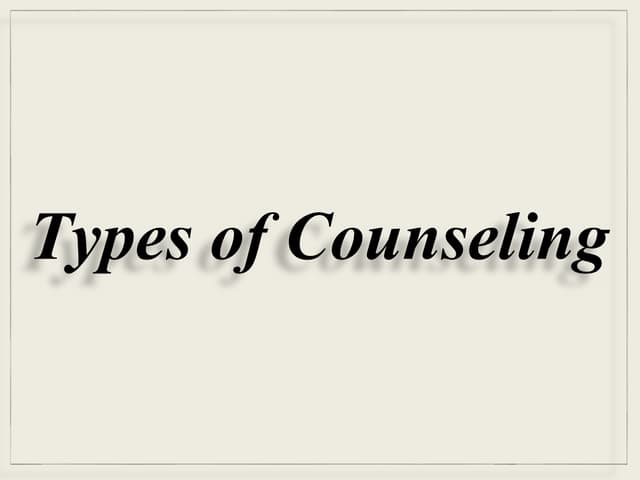A Comprehensive Overview to the Various Sorts Of Therapy and Their Effect
Counseling encompasses a variety of healing methods, each made to satisfy special mental health and wellness demands. From the organized strategies of Cognitive-Behavioral Therapy to the compassionate nature of Person-Centered Therapy, these modalities use distinctive pathways to personal development. Family members therapy and Dialectical Behavior Treatment provide additional frameworks for healing, while team counseling cultivates community assistance. Recognizing these varied methods can brighten their extensive influence on individual health. What continues to be to be explored are the complexities of each approach.

Understanding Cognitive-Behavioral Therapy (CBT)
Although lots of restorative approaches exist, Cognitive-Behavioral Therapy (CBT) attracts attention due to its organized, goal-oriented nature. This kind of treatment is based on the premise that thoughts, sensations, and actions are adjoined, and by transforming unfavorable idea patterns, individuals can alter their emotional reactions and activities. CBT uses various methods, such as cognitive restructuring, which aids customers recognize and test distorted beliefs. Behavior activation encourages involvement in pleasurable activities to fight clinical depression.
Usually, CBT is a short-term therapy, frequently long lasting between 12 to 20 sessions, making it accessible for those seeking quick outcomes. Its effectiveness has been well-documented in treating anxiety disorders, depression, and other psychological wellness problems. The therapist's function is to direct customers through exercises and research assignments, promoting self-awareness and advertising long-term coping methods. This practical approach equips people to take control of their mental wellness, ultimately causing enhanced life satisfaction.
Discovering Person-Centered Therapy
Person-Centered Therapy, established by Carl Rogers, supplies a different technique to Cognitive-Behavioral Treatment by highlighting the client's subjective experience. This restorative design prioritizes the individual's viewpoint, cultivating a setting of compassion, unconditional positive respect, and credibility. By allowing customers to explore their sensations and thoughts without judgment, therapists promote individual growth and self-discovery.
The core tenet of Person-Centered Therapy is the idea that individuals have the inherent capability for self-healing and personal growth. In this setup, the therapist acts as a helpful overview as opposed to a directive authority, motivating clients to organize their very own journey. This strategy is specifically reliable for those grappling with problems such as reduced self-confidence, anxiety, or depression, as it empowers them to confront and understand their emotions. Eventually, Person-Centered Treatment cultivates a strong healing partnership, promoting trust and openness necessary for purposeful change.
The Duty of Family Members Therapy in Recovery
Household treatment works as an essential component in the healing procedure for individuals and their partnerships. This therapeutic method concentrates on improving communication, dealing with conflicts, and promoting deeper links among family participants. By dealing with inefficient characteristics, household treatment encourages each member to express their ideas and sensations in a secure environment, advertising understanding and empathy.

The effect of family therapy prolongs beyond the sessions, as enhanced partnerships can lead to boosted emotional well-being for all included. On the whole, family members therapy plays a vital function in healing by cultivating unity, durability, and shared assistance amongst member of the family, inevitably directing them towards a much healthier, a lot more satisfying life together.
Unpacking Dialectical Behavior Modification (DBT)
Structure on the structure of therapeutic strategies that improve psychological health, Dialectical Behavior modification (DBT) offers an organized structure for individuals battling with intense feelings and behavioral obstacles. Developed by Marsha Linehan, DBT integrates cognitive-behavioral methods with mindfulness methods, intending to assist clients handle frustrating feelings and boost social efficiency.
The treatment is especially helpful for those identified with Borderline Character Disorder however is likewise appropriate to an array of various other psychological health and wellness problems. couples counselling. DBT includes individual treatment sessions and skills training groups, concentrating on 4 key ability collections: mindfulness, distress resistance, feeling policy, and social efficiency
The Benefits of Group Therapy Procedure
While private treatment supplies valuable insights, group therapy sessions use special benefits that can greatly boost the restorative experience. One vital advantage is the sense of area that arises among individuals. People often find comfort in sharing their experiences with others dealing with similar challenges, cultivating a supportive setting that decreases sensations of isolation.
In addition, group sessions encourage varied point of views, enabling individuals to pick up from each other's coping approaches and understandings. This collective knowledge can cause improved problem-solving capabilities and a wider understanding of individual concerns.
In addition, group counseling commonly advertises responsibility, as participants inspire one an additional to seek their goals and follow their commitments. Finally, the cost-effectiveness of group treatment makes it an obtainable alternative for many individuals looking for support. In general, the joint nature of team counseling sessions can greatly improve the therapeutic journey.
Regularly Asked Inquiries
What Credentials Do Therapists Required to Exercise Therapy?
Therapists typically call for an appropriate more info degree in psychology or counseling, together with monitored clinical experience. Furthermore, they have to get suitable licensure or qualification to exercise legally, ensuring adherence to professional requirements and moral standards.
Exactly how Do I Choose the Right Type of Therapy for Me?
Selecting the best sort of therapy involves assessing personal requirements, exploring various methods, considering specialist specializeds, and seeking referrals. Recognizing individual goals and preferences can significantly boost the effectiveness and fulfillment of the therapeutic experience.

Are Online Counseling Procedure as Effective as In-Person Ones?
The performance of on-line therapy sessions compared to in-person ones usually depends on private choices and situations. Research indicates that both techniques can generate positive outcomes, though some may discover greater comfort in face-to-face interactions.
The Length Of Time Does Counseling Generally Last?

What Should I Anticipate Throughout My Very First Counseling Session?
During the first therapy session, customers can anticipate an introduction, discussion of their problems, facility of goals, and an overview of the counseling procedure - virtual therapy. This preliminary meeting intends to construct connection and assurance comfort